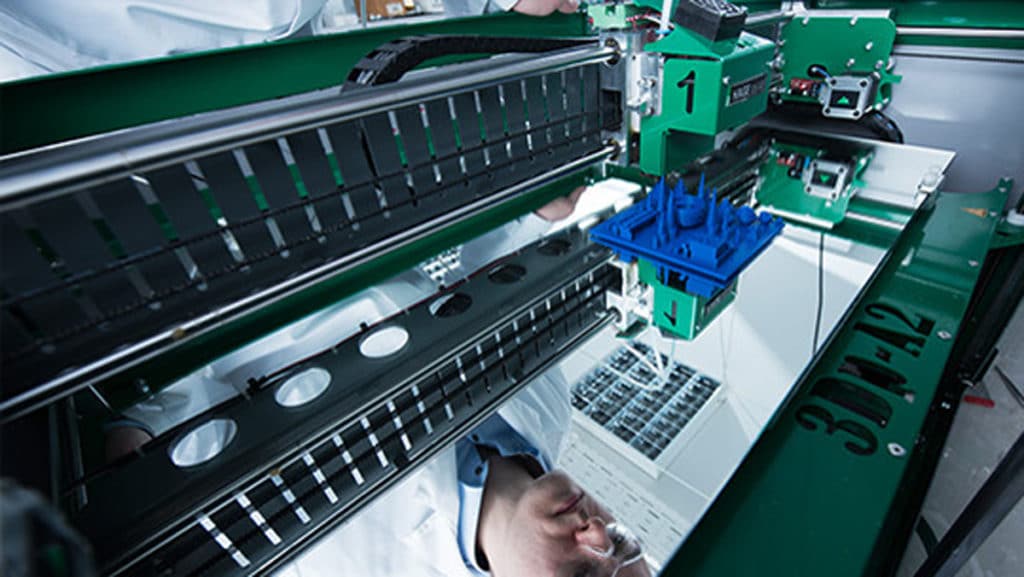The project inkjetPCB has been recently publicly granted in the Eurostars program and started on the 1st of November 2019. Main scope of this project is to develop fully inkjet printed multi-layer Printed Circuit Boards (PCBs) including embedded passive components as a commercially viable process.
As outcome of this collaborative innovation project, the consortium partners plan to deliver to their customers a “Complete Solution” for the digital additive manufacturing of PCBs including materials, equipment and process guidelines.
An increasing demand for alternative processes is present in the PCB manufacturing industry. Considering photolithography as main alternative solution, inkjetPCB will be: innovative, cheaper, simpler, greener, stronger and closer to the market. Compared with photolithography, inkjetPCB technology has a clear economic advantage with the potential to cut PCB prices of more than 50%. Moreover, PCB manufacturing by inkjet printing will open new possibilities for this well-established market.
Partners of the project are the ink suppliers P.V. Nano Cell Ltd. and Tiger Coatings GmbH, the printer manufacturer Notion Systems GmbH, and the PCB manufacturer Fela GmbH. Profactor GmbH and SCIO Holding GmbH are research partners.
Preliminary results, arising from previous projects like DIMAP (www.dimap-project.eu) or Re-Fream (www.re-fream.eu), clearly show our advancement in the field and our capability to create, together with our partners, a commercially viable solution for 3D printed electronics.
program: https://www.3dprintingelectronicsconference.com/program/
Interview
What drives you?
I am motivated by challenging ideas which could disrupt electronic manufacturing.
Why should the delegate attend your presentation?
To learn about our latest results in the field of 2D and 3D inkjet printed electronics and to be informed about our planned innovation project “inkjetPCB”.
What emerging technologies/trends do you see as having the greatest potential in the short and long run?
Digital printing direct-to-shape seems one of the most promising ideas which is lately trending in the field: directly printing on 3D objects manufactured using dissimilar technologies (e.g. 3D printing, injection molding, forming, etc.).
What kind of impact do you expect them to have?
A whole new range of functionalities could be given to any object. Moreover the biggest impact is represented by the compatibility and scalability of the process from prototyping to mass production.
What are the barriers that might stand in the way?
Additional efforts are needed to overcome material and process related barriers for manufacturability. Materials need to be processable but also posses high performance. Processes need to be more flexible and easily scalable.
In addition to this technical barrier, it is difficult to convince potential customers to implement a new manufacturing process that make use of technologies in which they do not have experience (inkjet, additive manufacturing, curing, sintering, etc.).
A lack of customer belief represents a barrier to the growth of this new market. Customers do not want to take on a disruptive technology until they can see that it works.
At the same time, it is difficult to prove that it works, in terms of robustness and reliability in volume, until a customer has taken it on. This vicious circle might be creating a barrier for the business development.
“Special quote”
3D Printed Electronics is the next stage in the evolution of electronics.
About Vito Matteo Di Pietro
Vito Matteo Di Pietro is a Research Engineer at Profactor GmbH working in the field of additive manufacturing. He received his MSc and BSc in Electronics Engineering from Politecnico di Torino, Italy with a specialization in Micro and Nano Systems.
In 2015 he started his career in Infineon Technologies Austria AG, working at the development of inkjet printing processes for semiconductor manufacturing. From 2017 he works as Research Engineer and Project Manager at Profactor GmbH where he currently design and lead research projects for the development of innovative manufacturing process.
About Profactor GmbH
PROFACTOR conducts applied production research with two focuses: Systems for industrial assistance and additive micro/nano manufacturing. We develop systems that combine man and machine, intelligence and processing power, human expertise and machine power.
PROFACTOR has years of experience in process development and in understanding materials and their printability using Nanoimprint Lithography and Inkjet Printing. Functionalization of freeform surfaces as key for new products.
featured image: Profactor
